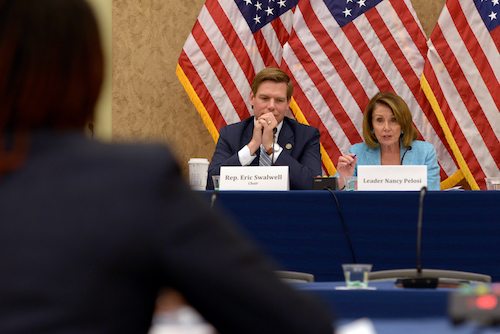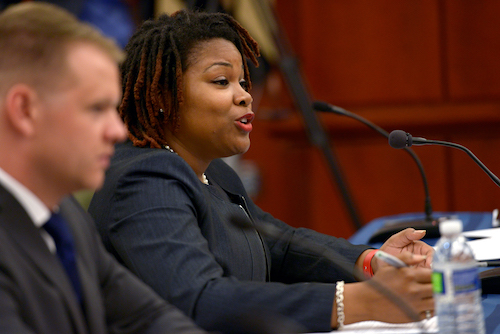The IBEW apprenticeship program
took center stage before the Democratic Steering and Policy Committee on
Capitol Hill June 15, with a member telling lawmakers that IBEW training makes
graduates immediately employable with journey-level skills that are valued
anywhere.

|
| House Minority Leader Nancy Pelosi speaks to panelists during a meeting of the Democratic Steering and Policy Committee on June 15. California Rep. Eric Swalwell, the committee’s vice chair, looks on.
|
The committee, chaired by Rep. Rosa DeLauro of Connecticut, helps set Democratic policy. The hearing was on challenges facing young adults in today’s economy.
“While entry into these programs is competitive, with an emphasis on math and science, we sponsor pre-apprenticeship programs to help with preparedness,” said Rachel Bryan, an international representative in the Department of Civic and Community Engagement. “RENEW chapters are working with the leadership of their local unions to educate young workers about the opportunities and benefits the apprenticeship program offers.”
Bryan was representing RENEW/NextGen, an IBEW initiative for members 35 and younger that nurtures future leaders.
“We have to consider the 60 percent of millennials that do not have a college degree,” DeLauro said. “They are a majority of the millennials who are part of the working public in the United States, so we need to look at how we provide job training, educational opportunities, and training for jobs in the digital economy, so that all workers are in position to get a job with fair wages.”
Bryan, who is a journeyman inside wireman and member of Dublin, Calif., Local 595, discussed construction apprenticeship programs with the curricula set by the Electrical Training Alliance, a partnership between the IBEW and unionized contractors.
Such programs can be an attractive alternative to college for some students because they finish them with little or no debt. Apprentices also are paid a salary and work on a jobsite while completing their education.
“I learned skills that can never be taken away,” Bryan said. “I am now able to build my community literally and figuratively. This is priceless. Well, really, debtless. I completed this program with no student loan debt and immediate access to employment.”

|
| Rachel Bryan, an international representative in the Department of Civic and Community Engagement, speaks to the Democratic Steering and Policy Committee.
|
That same day, President Donald Trump signed an executive order that called for an additional $200 million in federal funds to be spent on apprenticeship programs while also giving private industry more authority in designing them. It is expected to have little, if any, impact on the IBEW’s training programs, which are paid for by the IBEW and its signatory contractors.
In response to a question from Rep. Linda Sanchez of California, Bryan said RENEW/NextGen members are visiting with high school students and counselors to ensure the value of apprenticeships is better understood. That also should help make them more attractive to traditionally underrepresented groups, such as people of color and women, she said.
“Diversity is part of [the millennials’] mantra,” she said. “It’s not an issue for them.”
Rep. Darren Soto of Florida asked the panelists for one suggestion to improve the future of the economy.
“More investments in pre-apprenticeship programs that lead to apprenticeships,” Bryan said. “Investments in the building trades that lead to an improved infrastructure and into careers that are viable now and in the future.”
Bryan also noted in a response to a question from House Minority Leader Nancy Pelosi that the IBEW negotiates through collective bargaining for health insurance and pension benefits that young workers in other industries feel like they are missing out on. Pelosi appoints the committee members and attended most of the hearing.
“I’m very proud to be part of a union that works to provide this and believes that all workers should have these types of benefits,” she said. “I feel that we are leading the cause and others will follow.”
Other members of the panel were William Hubbard, vice president of government affairs for Student Veterans of America; Luisa Santos, founder of Lulu’s Ice Cream in Miami; and Jen Mishory, executive director of Young Invincibles, which works to give adults 18-34 a greater voice in health care, education and economic issues.